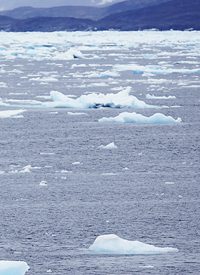
Global-warming alarmists are gearing up for the United Nations Framework Convention on Climate Change in December with increasingly threatening tales of pending eco-disaster. The latest of these comes in the form of a Reuters article that predicts "the Arctic Ocean will be ice-free during the summer within twenty years."
The claim is based on research that compares current sea ice cover at the North Pole to measurements taken in 2007. According to scientists quoted in the article, more sea ice is melting in the summer than should. They claim it will have a snowball effect on global warming by raising temperatures worldwide since the exposed dark ocean water absorbs sunlight rather than reflecting it as ice does. The article quotes Britain’s Energy and Climate Change Secretary Ed Miliband as saying, "This further strengthens the case for an ambitious global deal in Copenhagen."
But what about scientific evidence that weakens the case for Secretary Miliband’s "global deal?" It is unlikely the Climate Change Convention will provide a forum for valid scientific research pointing to the possibility that arctic ice levels do not pose a threat to global climate. Christopher Monckton’s Would CO2 Emission Cuts Save Arctic Ice and Reduce Sea-Level Rise? published in April of this year by the Science and Public Policy Institute deserves a public hearing. Monckton was a policy advisor to Margaret Thatcher in the 1980s, and his findings are based on research by mainstream sources such as NASA, the University of Illinois, and the University of Colorado.
Monckton reports that NASA recently "attributed this ice-melt to unusual northbound currents and winds bringing warmth up from the topics to the Arctic, and … that the summertime Polar winds in 2007/8 had blown much of the sea ice southward into warmer waters, where it melted." Further, University of Illinois researchers found that increased volcanic activity in the area could have contributed to summer melting in 2007. Since the average global temperatures cooled during the same time period, global warming cannot be blamed, argues Monckton.
But does all this melting translate to rising temperatures and sea levels? On the contrary, average global temperatures have steadily decreased during the same time period. As to sea levels, research conducted by the University of Colorado shows there has been no increase in the rate of rise over the last several centuries, and there is no evidence to support that this is increasing during the 21st century.
Also of note is sea ice at the South Pole. The University of Illinois reports that Antarctic sea ice levels have steadily risen to a 30-year maximum in late 2007. It shows, too, that worldwide levels remained relatively stable over the same 30-year period. Monckton says facts like these are largely ignored by global warming pundits having a meltdown over ice levels in the northern hemisphere. Unfortunately, such inconvenient facts will probably go unnoticed in Copenhagen, too.




